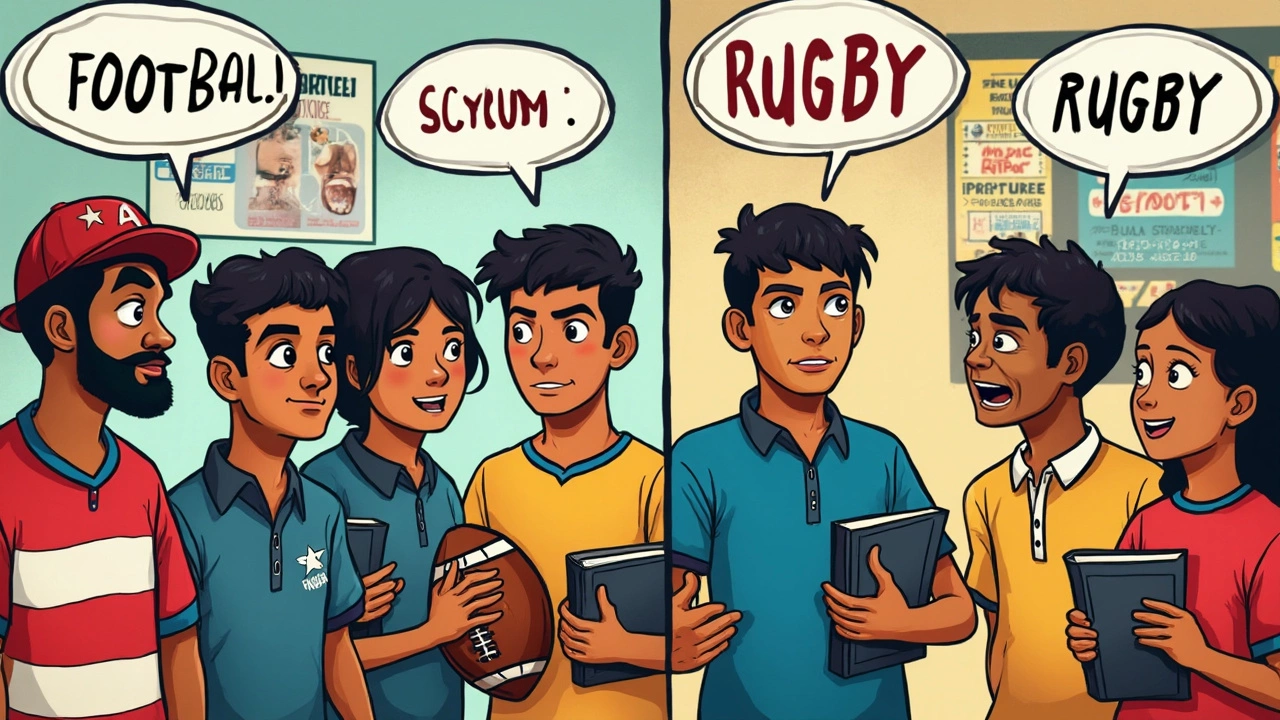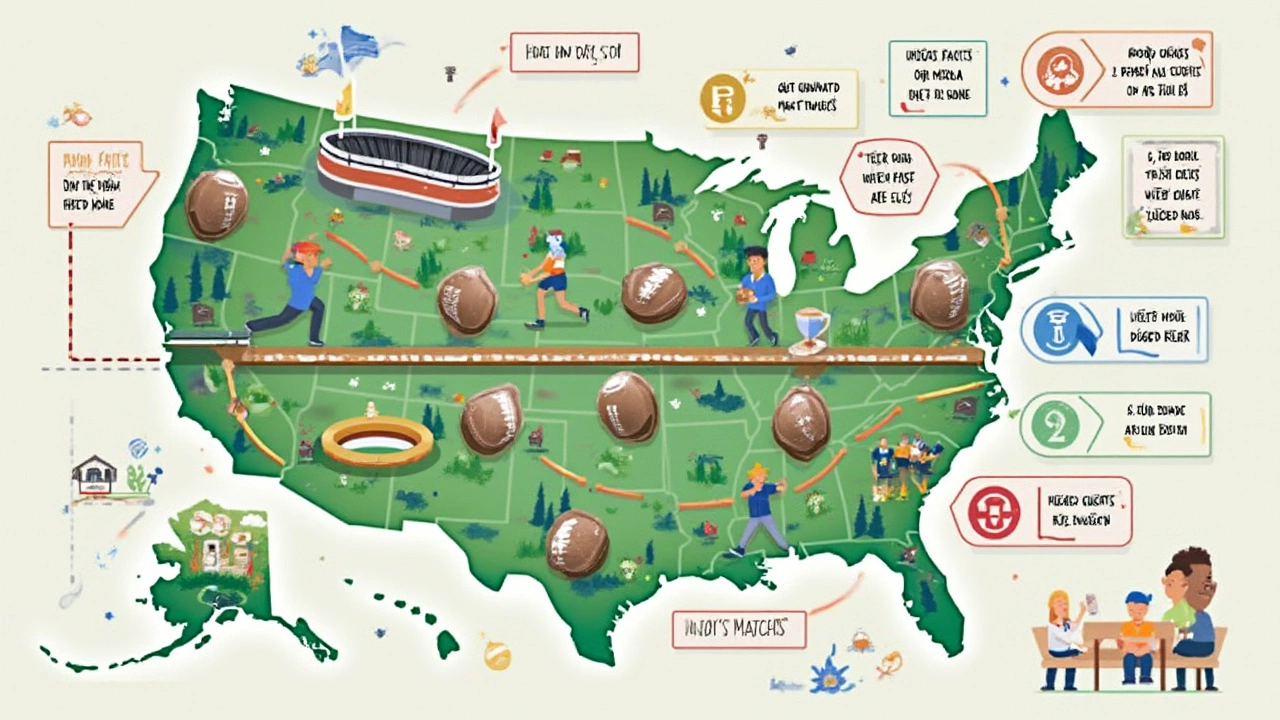Ever tried asking someone in the U.S. about rugby and got a blank stare—or maybe they started talking about football instead? You’re not alone. Americans do know rugby, but the word 'rugby' itself isn’t always used as you’d expect. Most folks just say 'rugby,' but if you dig a little deeper, you’ll see there’s a bit more going on.
Here’s the thing: in the U.S., if you say 'football,' almost everyone thinks of the NFL, not the game with scrums and lineouts. So, when Americans talk about rugby, they actually mean the same game people in England and Australia are talking about—but sometimes you’ll hear things like 'rugby union,' 'rugby league,' or even 'rugger' if you bump into someone who played in college.
- Quick Answer: The Name Game
- Rugby vs. Football: Clearing Up the Mix-Up
- Rugby Union, Rugby League, and American Terms
- How Americans List Rugby Fixtures
- Tips and Fun Facts for Watching Rugby in the U.S.
Quick Answer: The Name Game
If you walk up to most Americans and mention "rugby," they’ll know you mean the sport with the oval-shaped ball, scrums, and tackles. Rugby is the term people use across the country. Simple, right? But here’s where it gets interesting: Americans have made the language a bit more specific, depending on the crowd and context.
At most schools, sports bars, and events, folks just say "rugby." It’s direct and gets the point across. But when you get into serious fans or clubs—especially college teams—they might say "rugby union" or "rugby league" to point out which version they mean. Say "union," and you’re talking about the 15-a-side game. "League" means the 13-a-side version, which is rarer in the U.S.
Every now and then you’ll hear someone call it "rugger"—that’s old-school slang, usually from people who actually play the game or follow it closely. You won’t hear "football" in rugby conversations here. In American sports talk, "football" means gridiron football, like the NFL or college football.
- To Americans, "rugby" means the whole sport unless specified.
- They only say "union" or "league" when they have to clear up which code they mean.
- "Rugger" pops up in some circles, but it’s rare.
| Term | Who Uses It | What It Means |
|---|---|---|
| Rugby | General public | EITHER version, unless specified |
| Rugby Union | Clubs/Fans | The 15-player international game |
| Rugby League | Enthusiasts | The 13-player version, less common |
| Rugger | Players/Fans | Slang for rugby |
If you want to ask about a rugby match, just say "rugby game." Everyone gets it. Save the code details for major tournaments or die-hard fans who’ll actually care.
Rugby vs. Football: Clearing Up the Mix-Up
The confusion between rugby and American football is everywhere in the U.S. Most Americans use the word "football" to mean the game with helmets, shoulder pads, and the NFL. This is totally different from the rugby you see in other countries.
Here's a key fact: both rugby and American football evolved from the same sport played in English schools back in the 1800s. But once football took off in the U.S., it became a completely separate thing—think forward passes and touchdowns instead of tries and scrums.
If you ask an American, "Do you watch rugby or football?" most will assume you mean NFL games unless you stress "rugby." At the college level, though, you'll sometimes spot both games on campus, but they’re worlds apart. Rugby players tackle without pads, the ball’s shaped a bit differently (slightly more rounded at the ends), and the pace almost never stops for commercials.
One more thing: There’s also "football" as in soccer in the U.S., which only adds to the confusion. Americans call it "soccer," but in many other places, "football" is what the rest of the world calls soccer. No wonder visitors get mixed up!
- If you’re looking for a rugby fixture or event in the U.S., always check to make sure it’s not a football (NFL or college) or soccer game. Double-checking the sport is just how things are done here.
- When talking to Americans, stick with "rugby" so there’s no confusion, or be specific: "rugby union" or "rugby league."
So yeah, in the U.S., football is football, rugby is something else, and soccer is what most others would call football. It’s a mess, but at least now you know where the language gap comes from.

Rugby Union, Rugby League, and American Terms
Rugby isn’t just one game. There are two main versions: rugby union and rugby league. In most of the world, people know the difference, but in the U.S., almost everyone just calls it "rugby" unless they're die-hard fans. If you hear "rugby union," it's the more common type played in American colleges and clubs. "Rugby league" is less popular but does exist, mostly watched by folks already deep into the sport.
Here’s what makes them different: rugby union has 15 players per side and focuses more on set-pieces like scrums and lineouts. Rugby league has 13 per side and is faster, with more running and simpler rules. But unless you hang out with hardcore sports fans, most Americans rarely talk about rugby league at all.
- "Rugby union": The most common form in the U.S., especially at universities.
- "Rugby league": Has a small but loyal following, mostly among expats and enthusiasts.
- "Rugby": What most Americans say when talking about the sport, not specifying union or league.
- "Rugger": Old-school slang; you’ll hear it mostly from people who played decades ago.
To give you an idea of popularity, check out the numbers:
| Game Type | Registered U.S. Players (2024) | Main Regions |
|---|---|---|
| Rugby Union | 115,000 | California, New York, Texas |
| Rugby League | 2,000 | Florida, New York |
The top U.S. competition for rugby union is Major League Rugby (MLR), launched in 2018. It’s grown steadily and now features teams from cities like Seattle, Houston, and New Orleans. For rugby league, the scene is much smaller, with a few regional competitions and most play happening in amateur leagues.
If you’re searching for rugby events online in America, use "rugby fixtures" or "MLR schedule," and you’ll find union games. The word "league" usually brings up rugby league, but that’s still rare in daily conversation.
How Americans List Rugby Fixtures
If you’re trying to catch a rugby game in the U.S., knowing where and how to look up fixtures can be a challenge. Unlike the NFL or NBA, rugby matches don’t often make it onto the front page of sports programs or websites, especially outside big cities. Still, there’s a clear method to the madness.
Americans usually list rugby fixtures online, especially through club websites, college sports calendars, and national league websites. Scores and schedules for major leagues—like Major League Rugby (MLR)—are posted with dates, kickoff times (often with local timezone), the venue, and sometimes streaming info. Calling it a “rugby fixture” isn’t as common—most people use 'schedule' or just 'game list.'
- Professional matches: These are found on the MLR’s website or ESPN’s rugby section. The schedule usually shows home and away teams, stadium, kickoff time, and TV channel or stream.
- College games: Universities post schedules on athletic department pages. You’ll see opponent names, dates, and campus locations. Sometimes they’ll add a note if it’s a playoff or rivalry game.
- Local and club games: These can be trickier to find. Most clubs use Facebook groups or TeamSnap, so players and fans can see when and where the matches are.
Here’s a typical table you might spot on a Major League Rugby website:
| Date | Home Team | Away Team | Time (ET) | Venue | Broadcast |
|---|---|---|---|---|---|
| April 12, 2025 | New York Ironworkers | LA Giltinis | 7:00 PM | Red Bull Arena | FS1/MLR App |
| April 13, 2025 | Houston Sabercats | Seattle Seawolves | 5:00 PM | SaberCats Stadium | ESPN+ |
Notice how every detail maps out exactly when and where you need to be. Some sites even link you straight to ticket sales or live streams. And for amateur and youth rugby, don’t underestimate team Facebook pages—they’re often the first spot to update changes or rain delays.

Tips and Fun Facts for Watching Rugby in the U.S.
If you’re in the States and want to catch a rugby match, here’s what you actually need to know. First off, don’t expect rugby to be splashed across prime-time TV like the NFL or NBA. Major League Rugby (MLR) is the main professional league, and you’ll catch those games on channels like Fox Sports 2 or on streaming platforms like The Rugby Network.
College rugby is a big deal here too—especially in spring when schools like Cal Berkeley and Life University clash for national titles. Many matches are free to watch, and you might even stumble upon Sunday tournaments at public parks.
- MLR launched in 2018, and its season usually runs from late February through early July. Teams like the Seattle Seawolves and New England Free Jacks are popular picks.
- Super Bowl parties are a thing here, but rugby has its own common viewing tradition: watch parties at local pubs. Irish and British bars in bigger cities often show live international matches.
- Rugby fans tend to be super friendly—don’t be afraid to ask questions; most enjoy explaining scrum rules and scoring.
- Pro tip: if you're looking for rugby fixtures, check the USA Rugby site or the MLR schedule. American sports sites don’t always carry the latest rugby info.
And here’s a fun tidbit—most Americans are still surprised to learn rugby has two main codes: union and league. Union is the more common one here, so if someone invites you to "rugby," they probably mean union unless they specify otherwise.
One last tip: Bring some patience. Kickoff times, even at bigger bars, might slide a bit since soccer and NFL games often take priority on the TVs. But score a spot and you’ll meet expats, passionate locals, and maybe pick up a few new rugby phrases.
